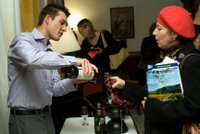


Panelists discussed current practices in and research on traditional, organic and biodynamic agriculture. They also assessed vineyard responses to scarce water, fluctuating fuel costs, pests and changing weather patterns, all of which will have enormous impacts on California's wine industry as the climate warms.

Miguel Altieri, professor in the Department of Environmental Science, Policy and Management, introduced agroecology: enhancing the resiliency and energy independence of vineyards in a warmer planet. This is a critical issue since climate change, as currently predicted, may push land in or out of the range required for making quality wine. He pointed to research that shows vineyards with several years of cover cropping exhibit a higher resistance to drought when compared with those that had their inter-rows mechanically cultivated. His work builds farmer-researcher alliances that he believes are key for developing alternatives and scaling up sustainable practices that cope with climate change

Kent Daane, Cooperative Extension specialist in Environmental Science, Policy and Management, spoke about the long tradition of Berkeley’s work on vineyard issues. His slides and videos highlighted topics of interest in sustainable mealybug control, taken from his own work on biological controls, sampling, mating disruption, cultural controls and insecticides. He discussed the problem of grape leafroll associated viruses which are currently the greatest mealybug concern for Napa / Sonoma Valley wine grape growers.

David Graves, co-founder of Saintsbury Vineyards, spoke about the industry concern with climate change. For example, the Iberian peninsula is already seeing changes such that some areas seem no longer suitable. But he pointed out that in Napa and Sonoma the fog system complicates climate predictions. He is interested in seeing closer definition of the perameters that make for fine wine grapes. Changing to new grape varities would be a difficult move because wineries have invested so much in brands based on current varieties. He noted the ironies of his own vineyard’s solar panels which are underneath a power line, and sheltering parked fossil fuel vehicles!

Caleb Mosley, viticulturist at Ridge Vineyards since 2006, focused on his responsibility for transitioning 70 percent of Ridge’s operation to organic. He explained that the reasons to move to organics are environmental, social and, economic and include response to market demand. He discussed the benefits and challenges of the move to organics and concluded that some of the challenges -- for example close attention to the critical timing of sulfur application or canopy management -- could lead to higher quality wine.
--Bernadette Powell
